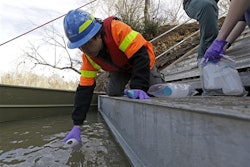RALEIGH, N.C. (AP) — Over the last year, environmental groups have tried three times to use the federal Clean Water Act to force Duke Energy to clear out leaky coal ash dumps like the one that ruptured last week, spewing enough toxic sludge into a North Carolina river to fill 73 Olympic-sized pools.
Each time, they say, their efforts have been stymied — by the N.C. Department of Environment and Natural Resources.
The state agency has blocked the citizen lawsuits by intervening at the last minute to assert its own authority under the federal act to take enforcement action. After negotiating with Duke, the state proposed settlements where the nation's largest electricity provider pays modest fines but is under no requirement to actually clean up its coal ash ponds.
Clean water advocates have long complained that state regulators are too cozy with the polluters they regulate. But they say that coordination and cooperation has become even more overt since the January 2013 inauguration of Gov. Pat McCrory, a pro-business Republican who worked at Duke Energy for 28 years.
In the wake of last week's massive spill, McCrory touted his track record with Duke over its coal-ash water pollution.
"My administration is the first in North Carolina history to take legal action against the utility regarding coal ash ponds," McCrory said, following a private meeting with company officials. "We have been moving on this issue since the beginning of my term and will continue to do so."
The environmentalists suggest his administration's real goal has been to shield the governor's former employer from far more severe and expensive penalties it might face if the cases ever made it to a federal courtroom.
Amy Adams was a regional director at the state environmental agency in charge of enforcing surface water standards for 21 North Carolina counties before she resigned in protest last November. A nine-year veteran of the agency, she said she was directed in her last months to help polluters meet compliance standards, rather than issue violations or fines.
"We have a governor right now that has very close ties to Duke, the state's largest polluter and a major political contributor to his campaigns," said Adams, who now works for the environmental group Appalachian Voices. "Under the new administration, North Carolina has changed the definition of who its customer is from the public and the natural resources it is supposed to protect to the industries it regulates. There's been a huge push away from environmental protection and toward promoting economic growth."
Since his unsuccessful first campaign for governor in 2008, campaign finance reports show Duke Energy, its political action committee, executives and their immediate families have donated at least $1.1 million to McCrory's campaign and affiliated groups that spent on TV ads, mailings and events to support him.
After winning in 2012, McCrory has appointed former Duke employees like himself to key posts, including state Commerce Secretary Sharon Decker.
His appointee to oversee the state environmental department, Raleigh businessman John Skvarla, describes his agency's role as being a "partner" to those it regulates, whom he refers to as "customers."
"That is why we have been able to turn DENR from North Carolina's No. 1 obstacle of resistance into a customer-friendly juggernaut in such a short time," Skvarla wrote in a letter to the editor of the News & Observer of Raleigh, published in December. "People in the private sector pour their hearts and souls into their work; instead of crushing their dreams, they now have a state government that treats them as partners."
On the afternoon of Feb. 2, a security guard patrolling the grounds of Duke's Dan River Steam Station discovered that a pipe running under a 27-acre toxic waste pond had collapsed. The company reports that up to 82,000 tons of coal ash mixed with 27 million gallons of contaminated water drained out, turning the river gray and cloudy for miles. The accident ranks as the third largest such coal ash spill in the nation's history.
The public was not told about the breach until the following day and initial reports provided by Duke and DENR did not make clear the massive scale of the disaster. McCrory made no public comments on the issue for five days, after the spill had grabbed national attention.
Environmental groups and federal regulators had been concerned for years about problems at Duke's 31 coal-ash waste ponds in North Carolina. Those concerns intensified after a 2008 disaster in Kingston, Tenn., where 5 million cubic yards of ash burst out of a basin, covering 300 acres and devastating a nearby river. The cleanup has cost $1.2 billion.
After Kingston, the Southern Environmental Law Center began examining the issue with conservationist groups and targeted a coal ash lagoon along the Wateree River in South Carolina.
On behalf of the Catawba Riverkeeper Foundation, the legal group filed a lawsuit against South Carolina Electric & Gas for violating state environmental laws. They reached an agreement that requires the utility to empty its lagoons and move the ash to a lined landfill licensed to handle hazardous waste.
Next, the environmental groups turned their attention to Duke's coal ash ponds in North Carolina. The groups had long shared water samples from lakes and rivers near the waste ponds with state regulators that showed contamination, but no fines were issued.
So in January 2013, the SELC filed a notice of intent to sue Duke in federal court over coal ash pollution at the company's Asheville Steam Generating Plant.
The Clean Water Act allows citizen groups to file lawsuits over environmental violations, but it requires them to give 60-days' notice to state regulators to take enforcement action before the case can proceed. On the 58th day after the notice, DENR filed notice it would assert its jurisdiction.
On March 26, the SELC sent another notice for contamination from coal-ash lagoons at the Riverbend Steam Station in Gaston County. On the 60th day, state regulators again intervened.
On June 19, the legal group once again sent a 60-days' notice to sue Duke over coal ash pollution leaking from Duke's Sutton Power Plant near Wilmington.
"The Sutton site is scary bad," said Frank Holleman, a senior attorney at the Southern Environmental Law Center. "They've got significant groundwater contamination on one side headed toward the drinking water wells of a poor community. On the other side, you have a popular public fishing lake where they had significant fish die offs, and fish contamination."
Once again, state regulators filed an enforcement action against Duke on the very last day. This time, however, the state also filed enforcement actions for all of Duke's remaining coal ash sites in North Carolina, which effectively blocks environmentalists from pursuing action against them under the Clean Water Act.
Meanwhile, the state announced a deal with Duke to settle the litigation involving the Asheville and Riverbend sites.
The state proposed that Duke pay $99,111 to settle the environmental violations at Asheville and Riverbend. Environmentalists criticize the proposed fines as couch-cushion change for a company valued at nearly $50 billion.
"This is a common technique of regulators who are friendly with the law-breaking regulated entities," Holleman said. "They will come in and file at the very last minute and then quickly propose a favorable settlement to the lawbreaker to prevent the citizens group from leading the litigation."
Lacy Presnell, DENR's general counsel, confirmed that the proposed settlement doesn't require Duke to move its coal ash.
"The proposed consent order sets forth a number of steps which would be necessary to lead to a decision for appropriate remedial action," the state lawyer said. Prior to joining DENR last year, Presnell took leave from his partnership in a small Raleigh law firm that represents utility companies.
A 2010 study by George Washington University Law School professor Robert L. Glicksman looked at enforcement actions in the state of Maryland under the Clean Water Act. He found that North Carolina is not the only state where regulators moved within the 60 day period to negotiate settlements favorable to the utilities.
"In several instances, states have 'over-filed' enforcement actions within this time frame in state court," Glicksman's study found. "These cases are often pursued at the request of the violator, who solicits state enforcement to shield itself from a citizen suit."
In a written statement, Duke said it is committed to closing the ash basins at "many" of its 14 coal plants across North Carolina that are no longer being used, including the Dan River facility. The company said it is transitioning to a more environmentally sound method for disposing of coal waste.
While it is studying the issue, however, Duke said it has no timetable for removing the waste from its leaky unlined ponds. One option, the company said, would be to cover the dumps with giant tarps to block rainwater.
"We will rely on science to close ash basins in a way that protects groundwater long-term and is prudent for customers and plant neighbors," the company said. "Closing ash basins provides the ultimate resolution to these issues, and site-specific engineering studies to determine the most appropriate closure method for each are well under way."
A state judge in Charlotte must still approve the state's agreement with Duke before it can be finalized. The environmental groups are pushing to scuttle the deal. They say last week's disaster shows what is at stake if the company is not forced to move its toxic dumps away from rivers and lakes.
"There is nobody in the state of North Carolina who is better positioned to get Duke Energy to empty out these polluting coal ash lagoons and clean up their pollution at Riverbend and all these other sites than Gov. McCrory," Holleman said. "The governor is responsible for what DENR does and there is nobody who could take action better than him."






















